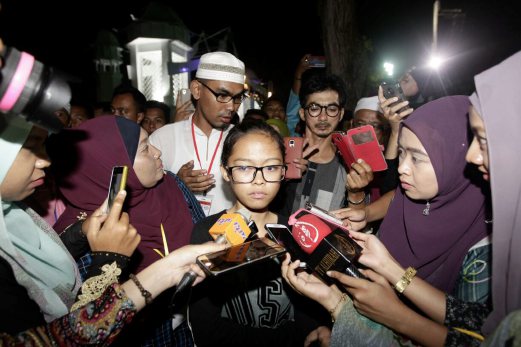A teenager Woo Nina Grace, 19, who attended a religious talk at Padang Astaka in Kemaman, recited the syahadah (declaration of faith) and became a Muslim.
The news-report said: ‘At the end of the talk titled “Muslims' Choice - Faith or Destruction", and the question-and-answer question, at about 12.45am, Zakir and Terengganu Menteri Besar Ahmad Razif Abdul Rahman met Nina in a room backstage.
‘Efforts by the press to interview Nina failed when they were stopped by the programme's secretariat.’
This prompts me to compare the “selling” of religion and the direct selling of goods. The latter is covered under the Direct Sales Act 1993 which provides the consumer a “cooling off period” of ten working days commencing on the day after the date of the making of a direct sale contract.
The purpose of the cooling off period is to give the consumer protection from being taken for a ride by the direct seller (of whatever goods or services) as he might have used high pressure sales talk, or may have misinformed the consumer about the product or service, or may have exploited the credulity of the consumer, or may have baited the consumer with statements such as “this offer is valid only for today”, etc.

The law recognises the predicament of the consumer in such situations and therefore provides protection by laying down the rule that the contract made on the spot does not take effect immediately, but after a lapse of ten working days in which the consumer has the right to re-think his decision, to discuss with others to find out more about the goods or services, and rescind the purchase totally. If he does so, he owes the seller nothing.
It is recognised by law that the consumer has a right to second thought in cases where he is approached and talked into, coaxed, or psychologically pressured into purchasing something on the spot which he had not gone out looking for.
But why doesn’t a person who converts to Islam on the spot have the same right to a cooling off period of ten working days to have a second thought and decide whether he has done right or not, and if not, rescind the conversion? Why is he not allowed to have contact with others but taken away into “custody”?

We talk of freedom of choice of religion. Where is that freedom when someone who has been “persuaded” to convert to Islam is not allowed the freedom to discuss his decision with others, to re-think or “sleep over” his decision and if he then so decides, to revert to his earlier status quo?
Why is the doctrine of “second thought” not a right of someone who converts to Islam? - MAILBAG




No comments:
Post a Comment
Note: Only a member of this blog may post a comment.